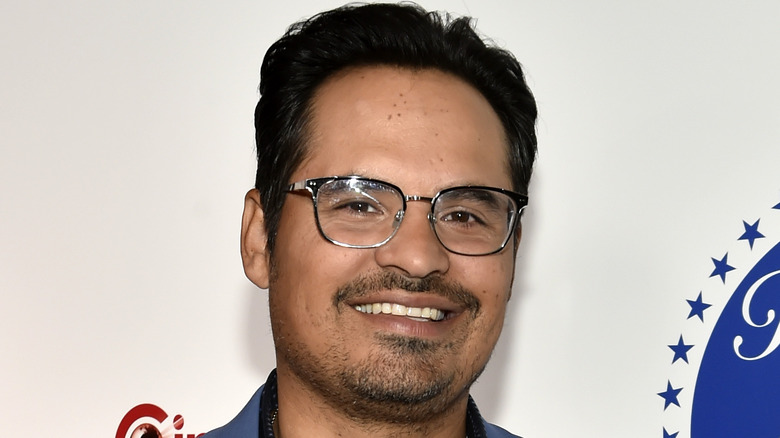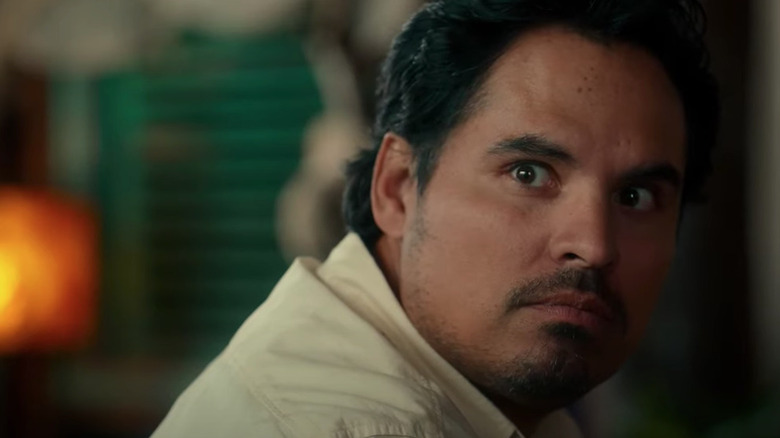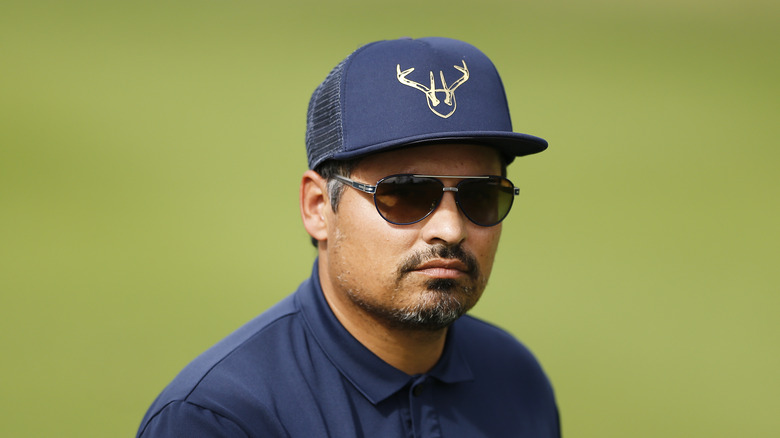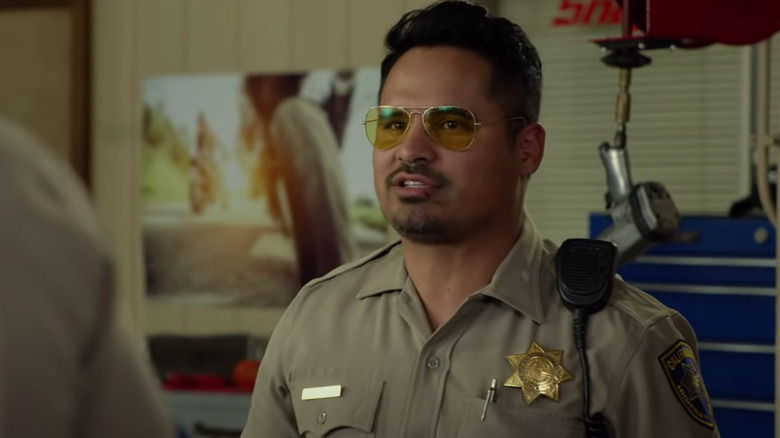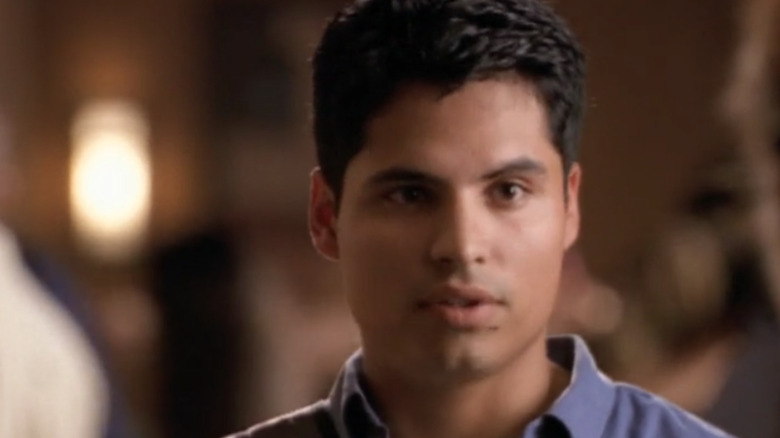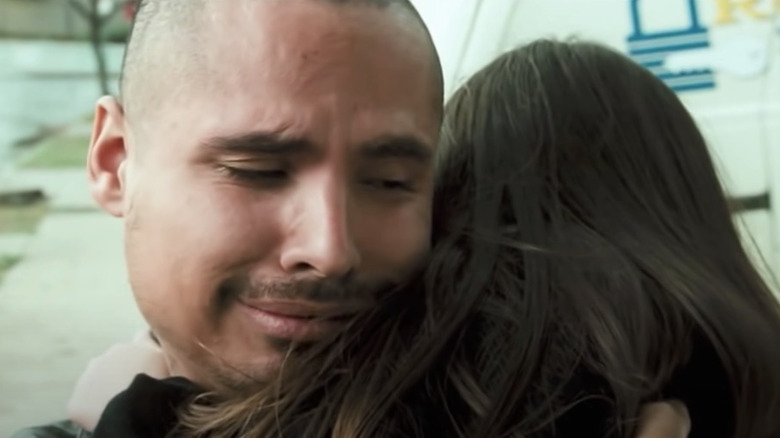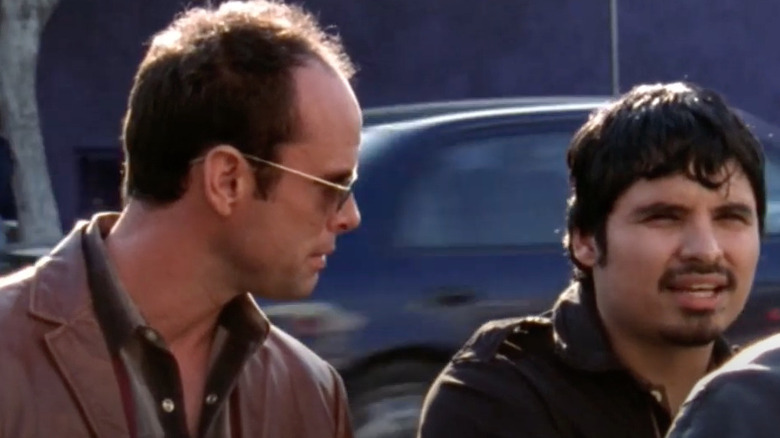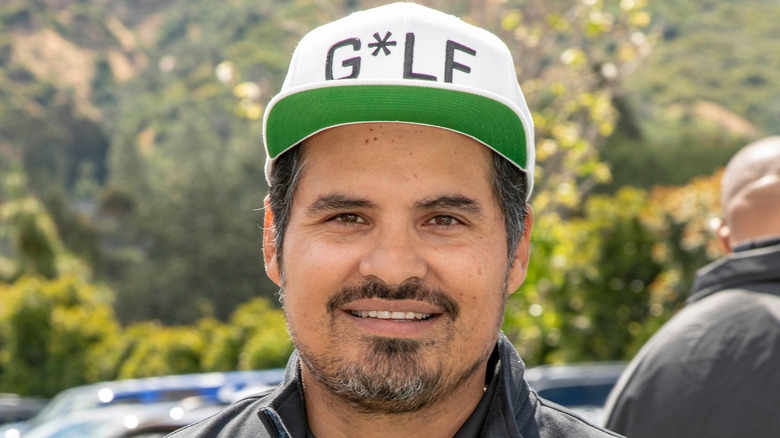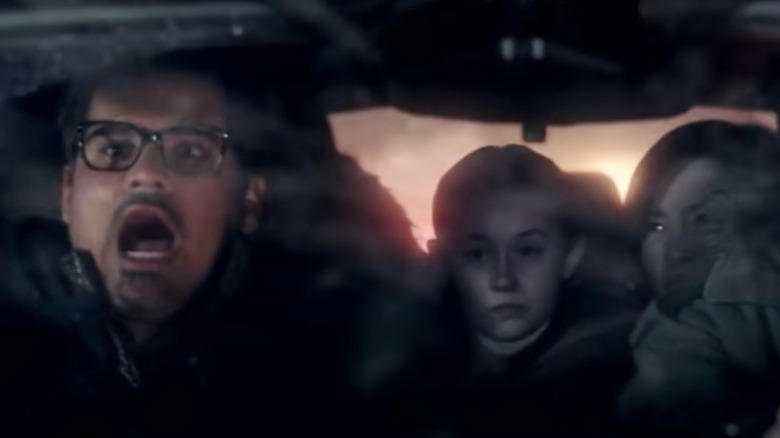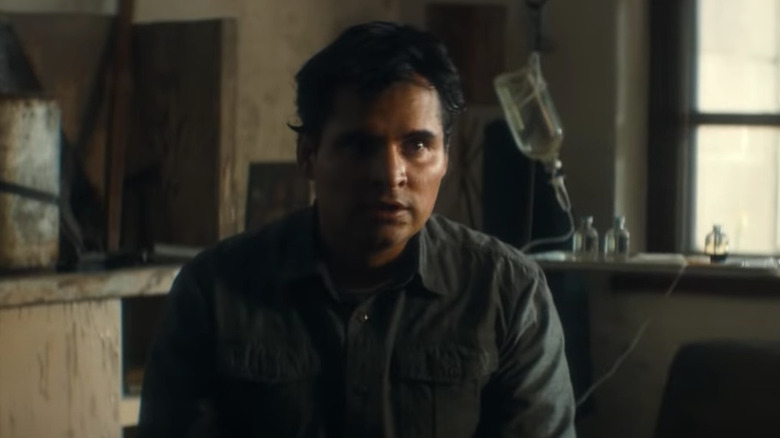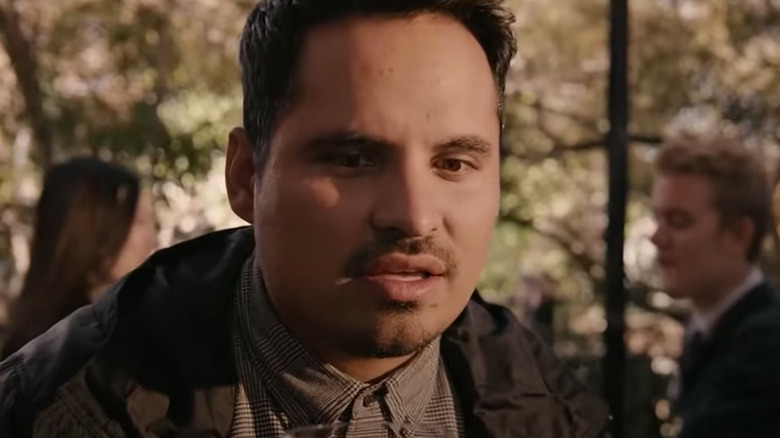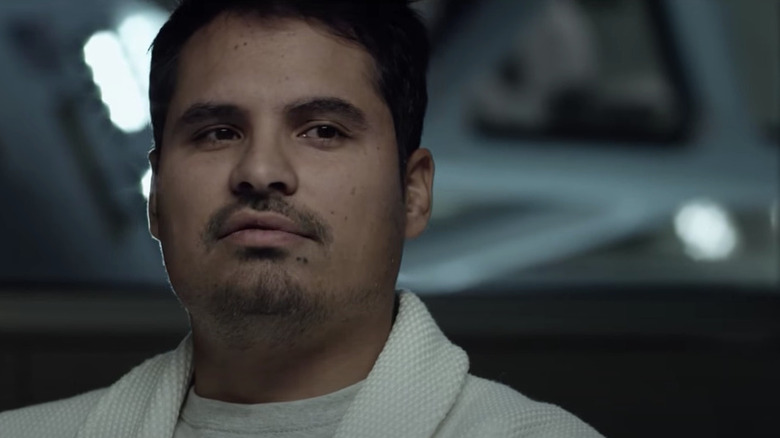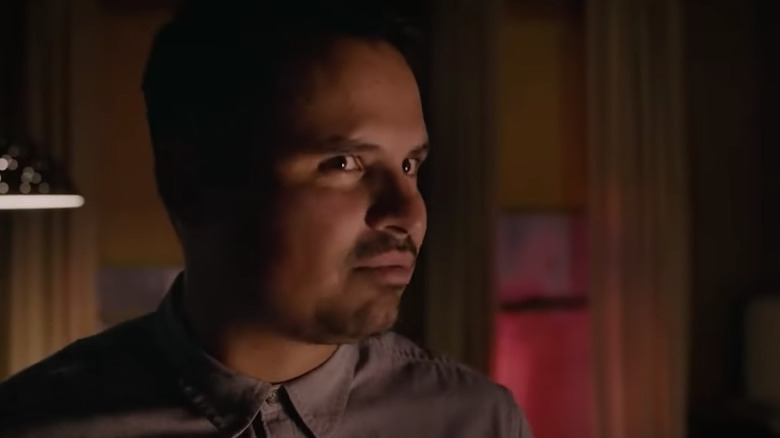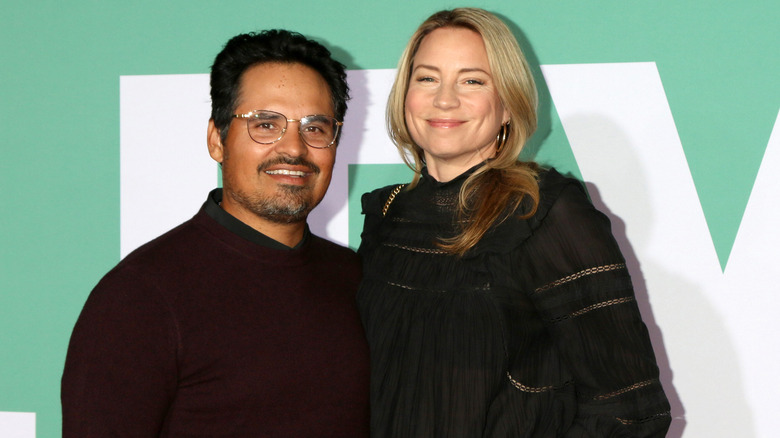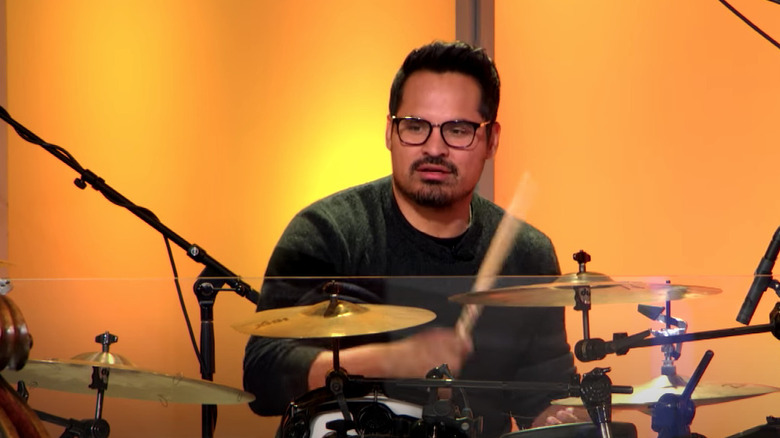The Untold Truth Of Michael Peña
For almost 20 years now, filmgoers have seen Michael Peña in a variety of roles. Somewhat recently, Peña joined the Marvel Universe as the hilarious and fast-talking burglar, Luis, in "Ant-Man." This departure for Peña, who can often be found in one uniform or another as a cop or federal agent, was a pleasant surprise for audiences. Many didn't know he had it in him (including his manager, but more on that below) but for Peña fans who've followed his career, perhaps it wasn't such a surprise.
After all, Peña has made a name for himself as a reliable actor — someone who always brings a deeper layer to the roles he plays and so infuses an "everyman" character with a heart of gold or emotional core. It's a conscious choice, as he feels the weight of representation as a Mexican-American actor in a world that still often only offers stereotypical roles to people of color. Read on to find out what other elements he brings to his work.
Michael Peña is a first generation Mexican-American
Although Peña grew up in Chicago, both of his parents were Mexican. When they first came to the United States, they weren't documented and, at some point, had to leave Peña and his siblings with a family for six months while they returned to Mexico. They crossed the border again and eventually did get their green cards, which allowed his mother to go to college to become a social worker, while his father worked in a factory.
The area where Peña grew up was filled with gang activity, which became a part of his childhood. In an interview with the Chicago Tribune, he talks about getting his first bike when he was 10 for "literally 30 minutes" before it was stolen and he got his "butt kicked." The neighborhood was super violent, and Peña remembers a time when he and his father walked by a march in a park: "It was the Ku Klux Klan. I remember my dad looking at all their eyes. That was my first education on how it is and how people view us." This early education of how others saw Latinos in the United States shaped Peña's approach to his career later on, as he would integrate his culture and identity into his work.
He was a wrestler
Before he discovered his interest in acting, Peña was an athlete who competed on his high school's wrestling team. Peña loved the WWF (now WWE) in his childhood, but was distraught to find that competitive wrestling didn't include body slams or ropes. When he went to try out for the team and realized how different it was from the WWF style wrestling, he almost left but then got cornered by the coach into going out for it. Peña joined the wrestling team, which he compared to acting during an interview with The Chicago Tribune: "I wasn't the strongest guy ... I was pretty average. The number one thing is the motivation to win. How am I going to beat this guy? In acting, I'm going up against models. How will I get this part?"
Peña sustained a number of injuries from wrestling, including cauliflower ear — which he drained because his girlfriend at the time didn't like the look of it. Eventually, he got so injured that he had to stop his senior year as he had "a broken nose and dislocated everything" from wrestling. Although Peña's wrestling career ended in his teens, his old athleticism has served him as his roles are often physical and he loves to do his own stunts, which he told The Movie Times takes "the pretend out of it" when trying to get into a character.
He didn't want to be an actor
Peña's first acting experience, of a sort, happened after switched to a private school at age 14: To get some extra cash for lunch, he would impersonate teachers for 25 cents. A few years later, the mother of one of Peña's friends convinced him to go to an open casting call because he was good at imitating people. Although he didn't get the part, he did get cast as an extra in the film, "To Sir, With Love II."
Peña describes meeting Sidney Poitier on the film, when he approached the legendary actor at craft service: "I was naïve. Sometimes it's good to be naïve ... I said, 'When did you start acting?' He was like, 'I was 18.' I was like, "I'm 19, right on time'" (via The Chicago Tribune). Peña started going out for auditions to try to help with his mother, who was ill at the time, although he only became successful after she passed away in 2000. Acting wasn't Peña's first love, and he described to The Guardian how he fell into the career: "Instead of loving it and then getting paid, I got paid and then loved it." Regardless of his reasons or timeline, clearly the choice worked out as, Peña has worked consistently since the '90s.
Michael Peña struggled to make a living
Peña moved to LA to pursue acting, but things didn't work out so well for him in the beginning. His parents weren't able to support him, so Peña would often find himself without money — occasionally sleeping on friends' couches and even living in a van for a month. He noted that it was a "long month" and that he had to shower in the clubhouse of the Oakwood Apartments, which was the residence outside of which he parked the van.
For Peña, even though moving to a new city and pursuing an uncertain line of work was a risk, it didn't feel like that to him. He described the feeling of leaving his home to The LA Times: "I think about where I grew up and how I grew up ... taking a chance wasn't really taking a chance. It was like you were going for something better. To me, there wasn't that much risk involved." It took four months before Peña started getting roles, primarily on shows like "Felicity," "Roswell," and "ER." Until that point, Peña would lie to his parents about his life, saying that he had an apartment and big TV instead of "sleeping in a van and using a box of cornflakes" for a pillow (via The Chicago Tribune). Luckily, it paid off and Peña can now acknowledge the situation and lie.
He added subtext to stereotypes
Peña got an agent after moving to Hollywood, who would send him out for "gang-banger roles left and right." While Peña had grown up in a gang-heavy area, he himself never joined a gang as he wasn't "a good follower" (via The Guardian). Just because these types of roles were the ones available, didn't mean that he resonated with them. In a 2004 profile in The Reading Eagle, Peña describes his approach to the influx of stereotypical roles: "I decided that instead of thinking of it as discrimination, I'd add some layers -– a lot of meaning behind the characters -– to these 'regular parts.'" He notes how he'd add subtext to these roles, especially ones that weren't written with much depth, even though he didn't really know what subtext was.
Peña's approach can be seen in all of his work — perhaps most memorably in "Crash," where he plays a former criminal named Daniel who's trying to turn his life around. Daniel, a gang member-turned-locksmith, gets caught in the fire of racism, prejudice, and anger after Farhoud (Shaun Toub) tries to shoot him for not properly fixing the lock on his store. Peña infuses Daniel with care and emotion, as Daniel tries to protect his daughter and give her a good life and fresh start. It's a quality he brings to all of his roles, and one that he's been practicing for decades now.
Michael Peña considered leaving LA
Although Peña found consistent work as an actor only a few months after moving to LA, his plans and career nearly took a turn after the sudden death of his mother in 2000. Peña returned home to Chicago to attend his mother's funeral, and felt like he was at a fork in the road. He wondered whether to return back home for good or continue trying to make it in LA. It was in this existential moment that Peña got a life-changing call from his manager: He had been offered a role in the Steven Spielberg-produced TV movie, "Semper Fi."
Although initially intended as a series, the pilot for "Semper Fi" was aired as a TV special instead and focuses on a U.S. Marine Corps Regiment. "Semper Fi" perhaps didn't wind up being what Peña had imagined, but the effect was the same as it kept him on the acting track. He recalled to The LA Times the feeling of getting this call while dealing with his mother's death: "It's like when something bad happens, something good will happen to rescue you. It was unbelievable. I had to believe my mom was looking out for me." Peña's work on "Semper Fi" opened up the doors for other roles on series like "NYPD Blue," "ER," and a ten-episode stint on "The Shield" – in addition to all the films that followed.
He wants to be a rom com lead
Many of Peña's roles put him in a uniform or position of authority, which has led to a bit of typecasting — something Peña has struggled to distance himself from. In an interview with The Guardian, he describes a formative phone call with his former manager: "You're not funny, Mike. That's what I'm hearing." It wasn't until 2010 that Peña appeared on "Eastbound and Down" as Sebastian Cisneros, the gaudy and exciting but insecure owner of The Charros baseball team. This role allowed him to display his comedic chops.
Clearly, since that awkward meeting, Peña has proven that he is funny and can work within the demands of comedy. One of Peña's most beloved roles has been his turn as Luis in "Ant-Man," a wordy burglar who gives extended stories of where he gets his tips. Since he's challenged that ex-manager's assessment of him, Peña has set his sights on a new bucket list item: Starring in a romantic comedy. Peña told The Guardian that he "could be a regular guy who's just funny" and perhaps star in "When Juan Met Sally." Fingers crossed that this wish comes true.
Michael Peña will only play Latino characters
Peña's Mexican heritage is an inextricable part of his life, both personally and professionally. While things have changed since the early days of his career, there is still a long way to go regrading Latinx representation. The presence of actors like Diego Luna in "Rogue One" and the seemingly omnipotent power of someone like Jennifer Lopez has done much to transform this, and Peña is committed to doing the same with his own power and visibility.
All of Peña's characters have Latin surnames. In Ridley Scott's "The Martian," Peña is Rick Martinez; he's Mike Zavala in "End of Watch;" and he plays Tom Lopez in Roland Emmerich's "Moonfall." Peña told The Guardian that this is a conscious choice — if his character doesn't have a Latin name, he asks the filmmakers to change it "so maybe some Hispanic kid might hear that and be inspired." As Peña's roles have gotten bigger, he's noted to The Hollywood Reporter that "I'm proud to be part of this generation where change is happening -– and happening in a big, big way. The opportunities I have now are definitely not what I had 20 years ago; I couldn't even audition for lead parts 20 years ago."
He went to the source for Narcos: Mexico
"Narcos: Mexico" is a powerful series that's based on the history of Mexico's drug cartel. The show centers around Miguel Gallardo (Diego Luna), the first leader of Mexico's drug empire, who initiates the Mexican drug war that's still seen today. Peña plays Kiki Camarena, a DEA agent who soon discovers that he's taking on much more than he bargained for with his investigation of Gallardo.
Although Gallardo is alive today (living in prison), Luna didn't want to get too much information about him so as to not be influenced with his portrayal. This wasn't the case for Peña, who was anxious to get more information about Camarena, who died in 1985. Peña told ET that "I didn't know how to play him because, on paper, it said he was a very focused, very determined guy, but why?" Peña wanted to know what "makes [Camarena] tick," so he went to the next best source: Camarena's wife, Mika. Her memory of Camarena was that he had to do something about injustices, or else it "would just keep him up at night." He took the formation of the cartel personally but "nobody would believe him, so it kind of fed his obsession with making people see what he sees." Peña's research helped infuse Camarena with that subtext he loves, making this one of his best roles to date.
He signed onto Ant-Man to work with Edgar Wright
Many fans may now know Peña as Luis, the wisecracking sidekick to Scott Lang (Paul Rudd) in Marvel's "Ant-Man." The original plans for the film, however, would have given us a much different role for Peña. When Peña first signed up for "Ant-Man," it was to work with the film's original director and co-writer, Edgar Wright: "His films have their own way of being. Their own life. It was a no-brainer," he told The Guardian. However, Wright and Marvel parted ways just before shooting, and Marvel brought in Peyton Reed to direct.
Peña describes the original Luis as more like himself in real life -– easygoing and soft-spoken -– but it wasn't working. Finally, he and Rudd cracked their dynamic: It would be better to do an "Abbott-and-Costello, Laurel-and-Hardy kinda thing. Focus on the opposites." With his character's energy locked in, Peña told Den of Geek that Reed gave him room to play and "run with it," which felt surprising in a Marvel movie. Fans were also surprised and delighted with the final, result as Luis quickly became a breakout character in the MCU.
Michael Peña works with directors he admires
Peña has had a long and fruitful career working with some of the most legendary directors in the business: Ridley Scott, Oliver Stone, and Alejandro Iñárritu. Many of them are directors he admires or has dreamed of working with. and Peña has not shied away from discussing his experiences working with these big names. In an interview with Den of Geek, Peña describes shooting with Ridley Scott on "The Martian" as "just unbelievable," as Scott could juggle five cameras at once while paying attention to all the details. Peña notes that he thinks Scott has a photographic memory, because he's able to cut the whole film in his head.
Following his turns in two Oscar-winning films in 2004, Peña had the chance to take on bigger roles — but he instead opted for a small part in "Babe,l" just so he could work with Iñárritu, whom he would later describe to The Hollywood Reporter as having a "quiet command of attention and respect." The love Peña has for directors is mutual as Oliver Stone -– who cast him in his 2006 film, "World Trade Center" -– told The LA Times that when he thinks of Peña, "a smile always comes to my face. He has an extraordinary potential future in front of him." Stone certainly wasn't wrong, and we can only imagine what other directors Peña will work with in the future.
He draws character inspiration from real life
Peña is someone who looks for inspiration and information with his characters; whether it's speaking to Camarena's wife to form a fuller portrait of Kiki for "Narcos: Mexico" or tapping into a wacky friend of a friend for Luis in "Ant-Man," Peña clearly does his homework. To capture the vibrant energy of Luis, Peña looked to Pablo, a friend of a friend who loves to talk, tell stories, and gesticulate. Peña imitates Pablo in an interview with Jimmy Fallon and notes how Pablo is ready for his reality show now.
Peña's skills of observation and impersonation were put to use when figuring out how to play Sebastian in "Eastbound and Down," whom he based on a guy that he met while on a cruise: "this guy looked like he had a lot of money. He was all, 'uh-huh, uh-huh, isss cool, isss cool," he recalled to The Guardian. Peña turned to outside inspiration once more for another comedy, "Observe and Report," where he appears opposite Seth Rogen and Anna Faris. In thinking about his character, mall security guard Dennis, Peña grabbed some mannerisms and characteristics from a guy in a documentary about pimps. It's easier for him to "point out what I find funny in others" rather than to draw from within.
He's a family man
In 2006, just a few years after his career really started taking off, Peña married artist and writer Brie Shaffer. The two of them had their son, Roman, in 2008. While Peña and Shaffer generally keep their private lives private, Peña has spoken about how fatherhood affected his role in "Narcos: Mexico." In an interview with ET, Peña talks about discovering a fundamental connection of fatherhood with the character of Kiki Camarena, who had three kids before he died.
Peña notes how his own role as a father was in the back of his mind while playing this role: "You get the feeling of potential loss, like you don't want your kids to grow up without a parent. So, you sort of take that into consideration whenever you're close to danger or not." Camarena is often in dangerous situations, and Peña calls back to this feeling in these moments. "That's what I would think of when I was playing certain parts or certain scenes, is that think of the big picture and is it worth it."
Michael Peña is a musician
Prior to finding success as an actor, Peña was a musician, who spent more time touring as a drummer than acting. Peña formed the band, Nico Vega, which was named after his mother, Nicolasa. He told The Chicago Tribune that there was a time when he would spend ten months touring, two months acting, and then "make what I needed from acting and would stretch it out." He left the band in 2007 to focus on acting and fatherhood but he later briefly returned to his music roots in the late 2000s to co-write a track for the band titled "Beast."
The song eventually reached Number 26 on the Billboard Hot Rock Songs Chart and spent four weeks on the charts (via Billboard). "Beast" has been used in films like "Jack Reacher" and "Pacific Rim," and was featured prominently in video game "Bioshock Infinite." Perhaps the most full-circle moment is this song — co-written by a former wrestler and WWF fan in Michael Peña — was used for a period of time as the entrance music for professional wrestler Drew Gulak.
